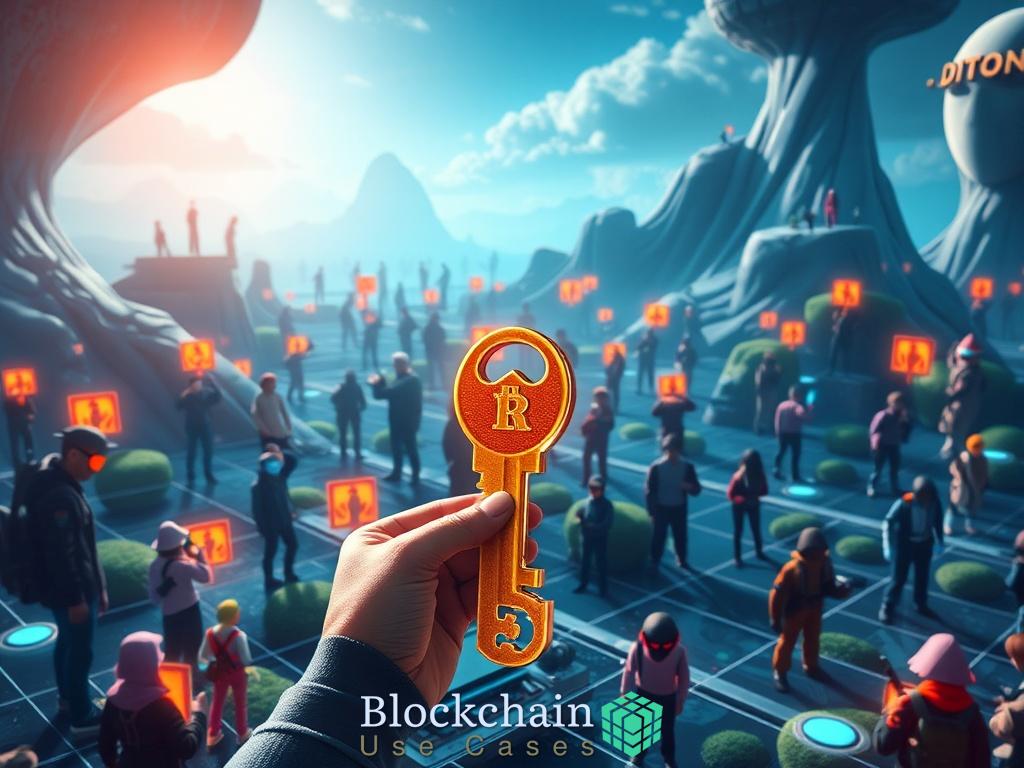Decentralized Identity Management

In an era where data breaches and privacy concerns are rampant, decentralized identity management through blockchain technology presents a transformative solution for gaming social networks. This innovative approach allows players to maintain control over their personal information, ensuring a safer gaming environment. Unlike traditional platforms where user data is stored centrally and susceptible to hacks, decentralized systems distribute data across a network, enhancing security and privacy.
At its core, decentralized identity management leverages blockchain’s immutable ledger to create unique, cryptographically secure identities for users. Instead of relying on usernames and passwords, players can authenticate themselves through digital wallets or cryptographic keys. This not only protects individual privacy but also minimizes the risk of identity theft—a significant concern in the gaming industry.
Here’s how decentralized identity management improves privacy:
- Ownership: Players have complete control over their personal data.
- Anonymity: Users can engage in gaming without revealing their real-world identities.
- Data Minimization: Only essential information is shared, reducing the risk of data exposure.
- Interoperability: Players can use their identities across multiple platforms without compromising security.
The adoption of decentralized identity management in gaming social networks is not just a technological upgrade; it’s a paradigm shift that prioritizes user privacy. As more game developers and platforms begin to recognize the value of blockchain, we can expect a surge in innovative applications that offer enhanced privacy solutions. This evolution will not only protect players but also foster a trustworthy environment that encourages participation and engagement.
Data Ownership and Control

As gaming evolves into a vibrant social landscape, the concept of data ownership and control has emerged as a pivotal concern for players. The rise of blockchain technology introduces a new paradigm where gamers are no longer mere products of the platforms they use but active participants in their digital narratives. This transition is crucial in an age where personal data is frequently exploited, and understanding how blockchain empowers gamers to reclaim their data is essential.
Understanding Data Ownership in Gaming is not simply about having access to information; it encapsulates the ability to manage, share, or restrict that information as desired. In traditional gaming platforms, players often surrender their data to corporations, who then monetize this information without adequate transparency. In contrast, blockchain facilitates a system where data is stored in a decentralized manner, enabling players to dictate how their data is utilized. This shift not only enhances individual autonomy but also fosters a culture of respect for player privacy.
Moreover, control over personal data extends beyond mere ownership; it encompasses the ability to engage with the gaming community on one’s own terms. Players can choose what aspects of their identity to share, ensuring that their real-world personas remain shielded from potential risks. This feature is particularly appealing in gaming social networks, where the blending of virtual and real-life identities can lead to privacy infringements. Blockchain’s secure infrastructure thus allows players to navigate these environments safely, with the power to manage their representation and interactions.
The Role of Smart Contracts further revolutionizes data ownership by automating agreements related to data usage. These digital contracts, embedded within the blockchain, can stipulate conditions under which personal data may be shared or sold. This not only enhances transparency but also instills a sense of trust among players, knowing that their consent is paramount. As a result, gamers can engage more confidently with platforms, leading to a more enriched gaming experience.
| Aspect | Traditional Platforms | Blockchain-Based Systems |
|---|---|---|
| Data Control | Limited, often inaccessible | Full ownership and management |
| Privacy Risks | High, due to centralized data storage | Minimized, thanks to decentralization |
| Transparency | Low, opaque data policies | High, clear data usage agreements |
In conclusion, the evolution of data ownership and control in gaming social networks, bolstered by blockchain technology, signifies a significant shift towards empowering players. This newfound autonomy not only enhances privacy but also encourages a more engaged and responsible gaming community. As gamers embrace this change, they are not just protecting their data; they are actively shaping the future of gaming.
Enhanced Anonymity in Transactions
In the rapidly evolving landscape of gaming social networks, the need for enhanced privacy is becoming increasingly critical. Players are not only concerned about their personal information but also the anonymity of their transactions. With the advent of blockchain technology, a robust framework has emerged that addresses these concerns through its inherent design principles. By enabling players to engage in transactions without revealing their identities, blockchain is setting a new standard for privacy and security in the gaming world.
Blockchain transactions are fundamentally different from traditional financial transactions, primarily due to their decentralized nature. Unlike centralized systems where user identities are tied to transaction records, blockchain allows for a level of pseudonymity. This means that while transaction details are publicly recorded on a ledger, the identities of the players involved remain obscured. For gamers, this enhanced anonymity not only protects their privacy but also safeguards their financial information from potential threats.
The following mechanisms highlight how blockchain enhances transaction anonymity:
- Pseudonymous Addresses: Players are represented by unique cryptographic addresses, which do not directly link to their real-world identities.
- Private Transactions: Advanced blockchain protocols enable private transactions that conceal transaction details from the public ledger.
- Mixing Services: These services obfuscate transaction trails by mixing funds from multiple users, making it difficult to trace the origin of funds.
To further illustrate the advantages of blockchain in enhancing anonymity, the table below compares traditional transaction methods with blockchain-based systems:
| Feature | Traditional Transactions | Blockchain Transactions |
|---|---|---|
| Identity Disclosure | Required | Pseudonymous |
| Transaction Visibility | Centralized and traceable | Decentralized with options for privacy |
| Risk of Data Breaches | High | Minimized |
| Control Over Data | Limited | Full ownership |
As gamers begin to recognize the importance of privacy, the adoption of blockchain technology is likely to grow. The enhanced anonymity in transactions not only fosters a more secure gaming environment but also empowers players to interact without fear of exposure. This shift towards privacy-centric solutions will undeniably shape the future of gaming social networks, allowing players to engage freely and confidently.
Smart Contracts for Privacy Protection
The emergence of blockchain technology has not only redefined the gaming landscape but has also introduced a powerful tool for enhancing privacy: smart contracts. These self-executing contracts with the terms directly written into code offer a level of assurance and transparency that is crucial for players seeking to safeguard their personal information. As gaming social networks continue to evolve, the role of smart contracts in privacy protection becomes increasingly vital.
Smart contracts operate on the principle of automation; they execute predefined actions when specific conditions are met. In the context of gaming, this means that players can establish clear agreements regarding their personal data. For example, a player could create a smart contract that specifies how their gaming achievements or personal information can be shared, ensuring that consent is given and terms are respected. This not only promotes trust between players and platforms but also minimizes the risk of unauthorized data usage.
The power of smart contracts lies in their ability to enforce privacy through programmable rules. Players have the autonomy to dictate the conditions under which their data can be accessed or utilized, effectively putting them in control of their own digital identities. Unlike traditional platforms where data handling policies are often obscure, smart contracts offer a transparent approach that aligns with players’ privacy expectations. Moreover, the immutable nature of blockchain ensures that once a smart contract is deployed, it cannot be altered without consensus, providing an extra layer of security for players.
In addition to enhancing individual privacy, smart contracts also pave the way for a more accountable gaming ecosystem. By embedding privacy protections within the contract itself, developers can create an environment where players feel secure about their data. This accountability is further reinforced through blockchain’s transparent ledger, which allows players to verify compliance with the terms set forth in the smart contracts. As a result, players are more likely to engage with platforms that prioritize their privacy, fostering a healthier gaming community.
Mitigating Data Breaches in Gaming Networks
As gaming social networks continue to expand, the threat of data breaches looms larger than ever. With traditional systems centralized and vulnerable, the introduction of blockchain technology offers a robust framework for safeguarding player information. By decentralizing data storage and employing cryptographic techniques, blockchain significantly mitigates the risks associated with data breaches, ensuring that players can engage without fear of exploitation or loss of personal information.
The primary advantage of blockchain in combating data breaches lies in its decentralized architecture. Unlike conventional gaming platforms that store user data in a single location, making it a prime target for hackers, blockchain distributes data across a vast network of nodes. This distribution not only enhances security but also complicates unauthorized access attempts. If one node is compromised, the rest of the network remains intact, thus preserving the integrity of player data.
In addition to decentralization, blockchain employs advanced encryption methods that further protect sensitive player information. By converting data into cryptographic formats, blockchain ensures that even if a breach were to occur, the stolen information would be virtually unusable without the appropriate decryption keys. Moreover, players can enjoy enhanced anonymity, as their identities are represented by unique blockchain addresses rather than personal details. This layer of protection is crucial in a gaming environment where players often share sensitive information.
To fully leverage blockchain’s potential in mitigating data breaches, players and developers must adopt best practices that enhance overall security. Here are some key strategies:
- Regular Software Updates: Ensure that all platforms and wallets are updated to the latest versions to protect against vulnerabilities.
- Smart Contract Audits: Conduct thorough audits of smart contracts to identify and rectify potential security loopholes.
- Two-Factor Authentication: Implement two-factor authentication processes to add an additional layer of security for user accounts.
- Educating Players: Provide resources and training for players on how to protect their personal information and recognize phishing attempts.
By adopting these strategies alongside blockchain technology, gaming networks can create a more secure environment that effectively mitigates the risks of data breaches. As the industry continues to evolve, embracing blockchain’s capabilities will be critical in protecting players and fostering a safe gaming community.





